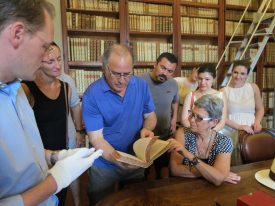How to Apply

Please review the eligibility criteria for participation in Summer Seminars
SELECTION CRITERIA
The seminar selection committee will read and evaluate all properly completed applications in order to select the most promising applicants and to identify a number of alternates.
Special consideration is given to the likelihood that an applicant will benefit professionally. It is important, therefore, to address each of the following factors in your application essay:
- quality and commitment as a teacher, scholar, and interpreter of the humanities;
- intellectual interests, in general and as they relate to the work of the seminar;
- special perspectives, skills, or experiences that would contribute to the seminar;
- the likelihood that the experience will enhance the applicant’s teaching and scholarship; and
- the conception and organization of the applicant’s current (or future) research and its potential contribution to the seminar.
When choices must be made among equally qualified candidates, however, NEH charges the selection committees to give preference to applicants who have not participated in an NEH-supported Seminar or Institute and to those who would significantly contribute to the diversity of the seminar or institute.
STIPEND, TENURE, AND CONDITIONS OF AWARD
Individuals selected to participate in one-week projects will receive a stipend of $1,300. Stipends are intended to help cover travel expenses to and from the project location, books and other research expenses, and ordinary living expenses. Stipends are taxable. Applicants to all projects should note that supplements will not be given in cases where the stipend is insufficient to cover all expenses.
Seminar participants are required to attend all meetings and to engage fully as professionals in the work of the project. During the project’s tenure, they may not undertake teaching assignments or any other professional activities unrelated to their participation in the project. Participants who, for any reason, do not complete the full tenure of the project will receive a reduced stipend.
At the end of the project’s residential period, participants will be asked to submit online evaluations in which they review their work during the summer and assess its value to their personal and professional development. These evaluations will become part of the project’s grand file.
APPLICATION INSTRUCTIONS (Applications from 2020 can be renewed, or preferably updated and resubmitted)
Before you attempt to complete an application, please study the project website, which contains detailed information about the topic under study, project requirements and expectations of the participants, the academic and institutional setting, and specific provisions for lodging and subsistence.
CHECKLIST OF APPLICATION MATERIALS
Résumé and References
A complete application consists of one copy of the following collated items:
- a detailed résumé, curriculum vitae, or brief biography with contact information for two professional references, and
- an application essay as outlined below.
Please include a detailed résumé, curriculum vitae, or brief biography (not to exceed five pages).
Be sure the résumé provides the name, title, phone number, and e-mail address of two professional references.
The Application Essay
The application essay should be no more than three double spaced pages. It should address your interest, both academic and personal, in the subject to be studied; qualifications and experiences that equip you to do the work of the seminar and to make a contribution to a learning community; a statement of what you want to accomplish by participating; and the relation of the project to your professional responsibilities.
- Applicants to seminars should be sure to discuss any independent study project that is proposed beyond the common work of the seminar.
- Applicants to institutes may need to elaborate on the relationship between institute activities and their responsibilities for teaching and curricular development.
SUBMISSION OF APPLICATIONS AND NOTIFICATION PROCEDURE
Completed applications should be submitted to the project Coordinator, not the NEH, and should be emailed no later than March 1, 2022. Application materials sent to the NEH will not be reviewed.
Send your application to:
Jolanta Saldukaityte
Seminar Coordinator
levinas.center@gmail.com
Please include in your subject line: NEH Summer Seminar Application
All applicants will be notified of their acceptance, waitlist or non-acceptance on Friday, March 25th, 2022 (not before or after), and they will have until Friday, April, 8th, 2022, to accept or decline the offer.
Note: Once you have accepted an offer to attend any NEH Summer Program (NEH Summer Seminar or Institute), you may not accept an additional offer or withdraw in order to accept a different offer.
EQUAL OPPORTUNITY STATEMENT
Endowment programs do not discriminate on the basis of race, color, national origin, religion, sexual orientation, disability, or age. For further information, write to the Equal Opportunity Officer, National Endowment for the Humanities, 400 7th Street, SW, Washington, DC 20024. TDD: 202/606‑8282 (this is a special telephone device for the Deaf).
Disclaimer: Any views, findings, conclusions, or recommendations expressed in this program do not necessarily represent those of the National Endowment for the Humanities.

